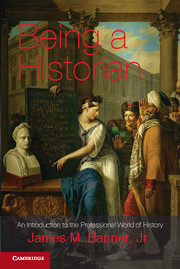Book contents
- Frontmatter
- Contents
- Preface
- Acknowledgments
- 1 The Discipline and Professions of History
- 2 The Structure of the Discipline of History
- 3 A Multitude of Opportunities
- 4 The Academic Trinity
- 5 History outside the Academy
- 6 Teaching and Writing History
- 7 Professional Principles, Responsibilities, Rights
- 8 Being Oneself as Historian
- Index
- References
1 - The Discipline and Professions of History
Published online by Cambridge University Press: 05 June 2012
- Frontmatter
- Contents
- Preface
- Acknowledgments
- 1 The Discipline and Professions of History
- 2 The Structure of the Discipline of History
- 3 A Multitude of Opportunities
- 4 The Academic Trinity
- 5 History outside the Academy
- 6 Teaching and Writing History
- 7 Professional Principles, Responsibilities, Rights
- 8 Being Oneself as Historian
- Index
- References
Summary
History is a single discipline practiced in many professions – in many places, in many ways, and through many means. Historians share the same discipline but not the same profession. In fact, they never have, unless an unwarrantedly limited definition of the term “discipline” is used. Throughout history's American history, even some of the most illustrious and ostensibly “academic” of academic historians have ventured to practice history, however episodically, in other occupations. This fact, until recently omitted from the taught history of history, lies at the heart of almost everything that touches the organized practices of the discipline today – just as it characterized those same practices more than a century ago, before historical study had become a clearly demarcated subject of inquiry and instruction. A full history of the efflorescence of history into many professions, one that goes beyond the elementary distinction between academic and public history, is yet to be written or yet to be incorporated into the way we normally speak of history and prepare students for careers in it. What follows is a sketch of how that history might be told.
Before the emergence of recognizably modern professions in the nineteenth century, historical knowledge was deeply implicated in the learning and arguments of lawyers, doctors, and clerics whose learned callings and occupations would be the first to form themselves into professions. No less significantly, argumentation from history was the stock-in-trade of statesmen and politicians. But from the late nineteenth century on, when the norm that governed a career in service to history came increasingly to be the creation, transmission, and evaluation of historical learning by specially trained people working full time as historians on college and university faculties, professional history became roughly coterminous with academic history. Yet it is now becoming clear that, rather than being a terminal point in the history of the discipline of history, history's main residence in the academy, although a century long, ought to be considered provisional and, while still the center of gravity in a larger constellation of professional locations, only one among many places from which history has begun to reemerge into the larger society. The consequences of ignoring the implications of these historical facts – of thinking that the history of the discipline in the United States is solely a correlative of the history of research universities – haunt historians’ bearing, work, and thought and make difficult their adaptation to rapidly changing professional realities.
Information
- Type
- Chapter
- Information
- Being a HistorianAn Introduction to the Professional World of History, pp. 1 - 33Publisher: Cambridge University PressPrint publication year: 2012
References
Accessibility standard: Unknown
Why this information is here
This section outlines the accessibility features of this content - including support for screen readers, full keyboard navigation and high-contrast display options. This may not be relevant for you.Accessibility Information
- 1
- Cited by
